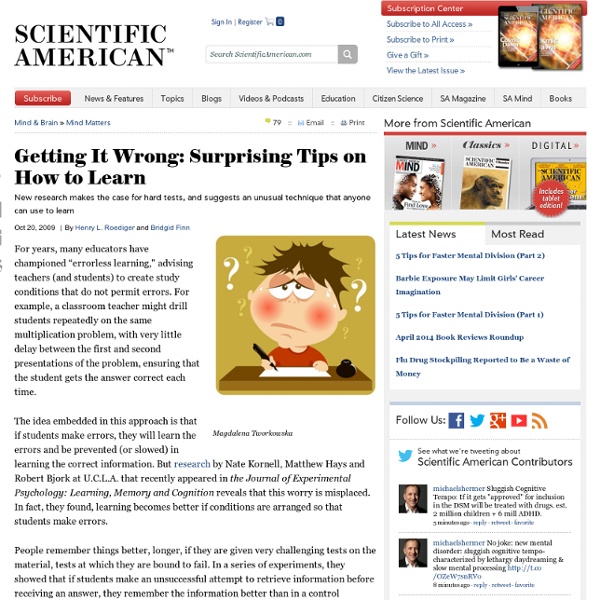Test-Taking Cements Knowledge Better Than Studying, Researchers Say
The research, published online Thursday in the journal Science, found that students who read a passage, then took a test asking them to recall what they had read, retained about 50 percent more of the information a week later than students who used two other methods. One of those methods — repeatedly studying the material — is familiar to legions of students who cram before exams. The other — having students draw detailed diagrams documenting what they are learning — is prized by many teachers because it forces students to make connections among facts. These other methods not only are popular, the researchers reported; they also seem to give students the illusion that they know material better than they do. In the experiments, the students were asked to predict how much they would remember a week after using one of the methods to learn the material. Several cognitive scientists and education experts said the results were striking. The final group took a “retrieval practice” test.
Test Yourself to Learn Better
Summer's over and school is starting again. For students, school means learning and testing. Most students believe that learning is the real reason that students are in school, and then they are tested to make sure that they learned what they were supposed to have learned. Because students believe that learning and testing are separate things, they often study inefficiently. Growing evidence from a variety of researchers including Robert Bjork at UCLA and H.L. Ideally, you start with some learning experience. A paper by Vered Halamish and Robert Bjork in the July 2011 issue of the Journal of Experimental Psychology: Learning, Memory, and Cognition describes a number of the advantages of studying by testing yourself over traditional methods of studying. The authors point out two key benefits of studying by testing. In addition, the harder the test, the bigger the advantage of studying by testing over studying in the traditional way. Finally, this works even if you're not in school.
Word on the Tip of Your Tongue? Study Suggests You're Better Off Looking Up the Answer
Have you ever been asked a question that you know the answer to, but found yourself struggling to think of the correct word? "Oh, I know this," you might say. "I know that it starts with a B." While it may be tempting to spend some time struggling to find the answer, research by psychologist Karin Humphreys and Amy Beth Warriner suggests that the more time you spend trying to remember a word on the tip of your tongue actually makes it more likely that you'll struggle with the word again in the future. "Your spinning your tires in the snow," Humphreys explains in a ScienCentral interview. "Your digging yourself in deeper." Humphreys own interest in the topic comes from personal experience struggling to remember certain words that seemed to continually pose a challenge. In the study, researchers showed 30 participants questions that they either knew, didn't know or had the answers at the tip of their tongues. The study has important applications for students and educators. Related Reading:
What’s Your Best Guess? Predicting Answers Leads to Deeper Learning
Teaching Strategies Flickr: saxtourigr Predictions pique our interest. Once we wager that our favorite sports team will win, we want to know the final score. Once we guess the identity of the murderer in a mystery novel, we keep reading to find out if we were right. The same holds true, it turns out, in the learning of mathematics. Students who view mathematics as only memorizing facts and procedures are often unsure of when or how to apply what they have learned. To test their theory that making predictions would facilitate learning, Lisa Anne Kasmer of Grand Valley State University and Ok-Kyeong Kim of Western Michigan University designed a lesson plan in which the teacher started off the class with a series of prediction questions. The pupils wrote down a prediction, along with explanations supporting their guess, and then discussed their responses with their classmates. Making predictions, Kasmer and Kim explain, helps prime the learning process in several ways. Related Explore: math
Test-Taking Cements Knowledge Better Than Studying, Researchers Say
The research, published online Thursday in the journal Science, found that students who read a passage, then took a test asking them to recall what they had read, retained about 50 percent more of the information a week later than students who used two other methods. One of those methods — repeatedly studying the material — is familiar to legions of students who cram before exams. The other — having students draw detailed diagrams documenting what they are learning — is prized by many teachers because it forces students to make connections among facts. These other methods not only are popular, the researchers reported; they also seem to give students the illusion that they know material better than they do. In the experiments, the students were asked to predict how much they would remember a week after using one of the methods to learn the material. Several cognitive scientists and education experts said the results were striking. The final group took a “retrieval practice” test. Dr.



